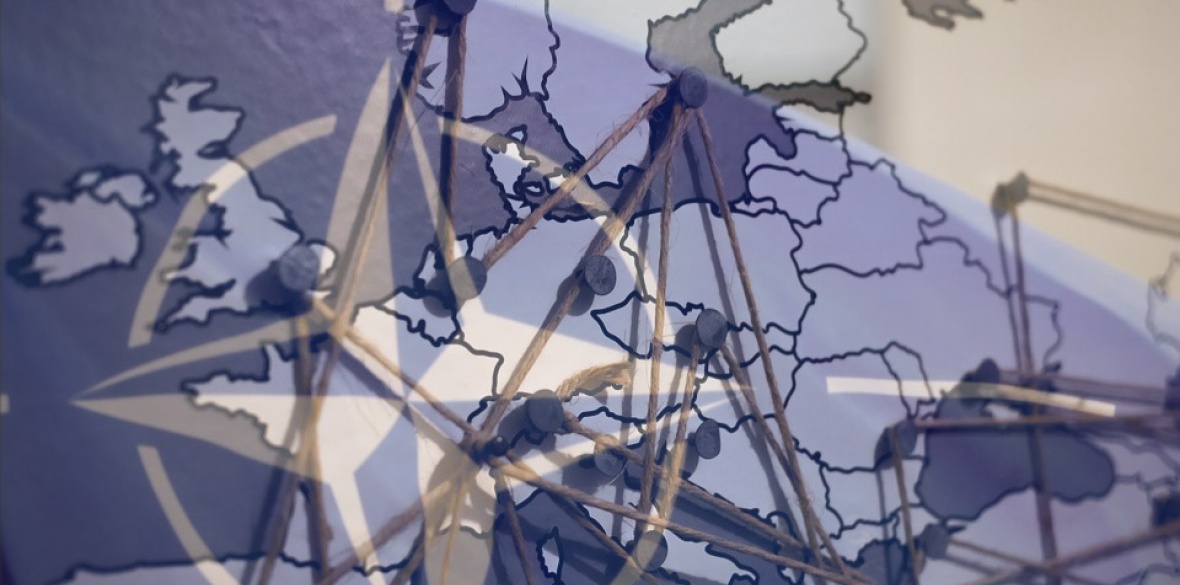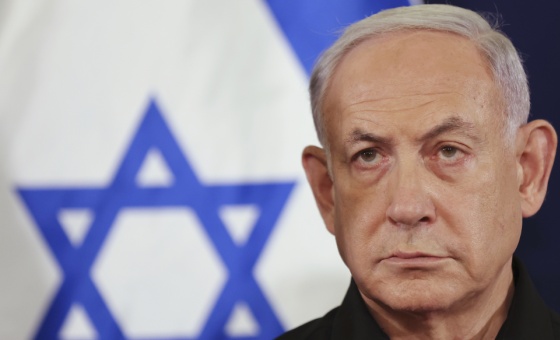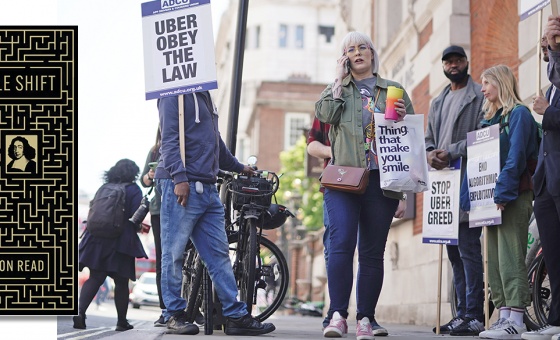This is the last article you can read this month
You can read more article this month
You can read more articles this month
Sorry your limit is up for this month
Reset on:
Please help support the Morning Star by subscribing here
THIS week foreign ministers from Nato countries are in Washington DC for a series of events to mark the 70th anniversary of the North Atlantic Treaty. Signed in that city on April 4 1949 by the US, Canada, Britain, France, Luxembourg, Belgium, the Netherlands, Italy, Portugal, Denmark, Iceland and Norway, it was the first military treaty binding together the US, key imperialist states in Europe and their allies on both sides of the Atlantic to pursue what Winston Churchill had referred to in his Fulton, Missouri speech in 1946 as the US-led “overall strategic concept.” However dressed up, the plan was to secure the post-war world for monopoly capitalism, bring down the Soviet Union and socialist countries of eastern Europe and crush any green shoots of socialism wherever they might spring up — in the heartlands of imperialism or in the newly liberated former colonies.
Article 5 of the Treaty provided for mutual assistance should any member be attacked. The Soviet Union was cast as an existential threat — though all its energy was directed towards rapid post-war reconstruction, securing international arms reduction agreements, banning the use of nuclear weapons and achieving peaceful coexistence.
The mass media whipped up fear of communism and of imminent attack through conventional warfare and weapons of mass destruction to be unleashed by the Kremlin and its Red Army. The treaty and media-induced panic facilitated the moulding of Western Europe as a vast military bloc, the maintenance of huge armies with extensive periods of national conscription, the proliferation of US and other military bases in Britain and elsewhere and the deployment of US troops and warplanes. It also stimulated soaring expenditure on research into ever more lethal warfare, eating up the government science budgets of member countries which could have been directed to meeting people’s needs.
In Britain, government spending on science increased from £5 million in 1937 to £78m in 1947 to £234m in 1953, 80 per cent of which was warfare-related. It engaged the Soviet Union in an unwanted and economically devastating arms race, forced the formation of the Warsaw Pact alliance for the self-defence of the socialist countries in 1955, and terrorised the whole world with the threat of nuclear annihilation — anything by any method to halt the progress of socialism.
These developments did not, of course, come out of nowhere. While the war still raged across the continents and people everywhere hoped for peace, democracy and freedom from colonial oppression, imperialism was laying the foundations of a very different world that would meet its need for hegemonic control of resources, labour and markets once the current hostilities had ceased.
Winston Churchill was on the case on behalf of the right-wing British establishment before the ink had even time to dry on the document bringing war in Europe to a halt. On May 9 1945 in Berlin, the German high command formally ratified the instrument of total and unconditional surrender. Duplicitous Churchill told Stalin that the future of humanity depended “on the friendship and understanding between the British and Russian peoples,” to which, on May 10, Stalin replied, looking forward to “the further successful and happy development in the post-war period of the friendly relations which have grown up between our countries in the period of the war.”
But Churchill had no interest in such things. On May 12 he telegraphed US president Harry Truman that an iron curtain was drawn across Europe, that what lay behind it was unknown and that, from behind it, the Soviet Union might advance at any time to the North Sea and Atlantic shores.
This theme he substantially developed in his infamous Fulton Missouri speech on March 5 1946, considered a key opening salvo of the cold war, accusing the USSR of aspiring to the “indefinite expansion of their power and doctrines” and promoting a proposed “special” relationship between Britain and the US. Only months later, on March 12 1947, the Truman Doctrine announced that the US would provide political, military and economic assistance to all democratic nations under threat from external or internal authoritarian forces.
Truman, of course, had the Soviet threat clearly in mind and thus instigated the equation of communism and totalitarianism and “justification” for US intervention across the globe in any country that didn’t fall in line with imperialism’s plans, as exemplified almost straight away by US economic and military intervention to defeat the communist forces in the civil war in Greece.
The truth was that things had not gone entirely as anticipated for the West. During the 1930s, the capitalist powers had expected that Hitler fascism, working in favour of the most reactionary monopoly capital in the world, would obliterate socialist thinking and aspirations, together with the labour and political organisations of the working class in Germany and other European states over which they took control.
This had not happened despite all the terror unleashed on communists and left and progressive people everywhere. Moreover, the allies had hoped that the fascist armies would be turned on the socialist Soviet Union and finish it once and for all. But the defeat of fascism by the Red Army in the USSR and eastern Europe showed that the great tide of revolutionary transformation initiated by the Great October Socialist Revolution could not at that time be withstood.
At the same time, the European capitalist heartlands were bombed out and devastated; business, industry and infrastructure were wrecked; international trade was virtually wiped out; economies were in ruins; people were hungry and food could not be produced to feed them and governments were bankrupt. At the same time, leadership of imperialism was inevitably passing to the US on whom the west European states by the end of the war relied for bank-rolling their economies and protecting their interests. The need was mutual. For the US, Europe was crucial for its hegemonic plans including for the deployment of monopoly finance capital on a massive scale, while exerting military protection of its interests and forcibly halting the spread of socialism.
The Soviet Union characterised the North Atlantic Treaty as an aggressive pact directed at the USSR in contravention of the UN Charter, the Anglo-Soviet alliance of 1942 and the Yalta and Potsdam agreements, the purpose of which was Anglo-American world domination. It is ironic that, after all the efforts to create the alliance by the most reactionary forces in Britain, it was the post-war Labour government that took the country into Nato.
In April 1949, the executive of the Communist Party (CPGB) stated categorically that “The Atlantic Pact is not a pact for peace, it is a pact for war. It is the direct continuation of the policy of Churchill’s Fulton speech and the Truman Doctrine — openly directed to the aim of building up a war front against the socialist Soviet Union and the people’s democracies of eastern Europe.”
And this is what for 42 years it proved to be. After the end of the Cold War in 1991 – with the destruction of the Soviet Union, the bringing down of the socialist countries of eastern and central Europe and the break-up of the Warsaw Pact, Nato’s articulated raison d’etre ceased to exist. However, the years that followed saw an escalation rather than diminution of the alliance’s reach — with countries “strategic” to imperialism, including the former socialist countries of eastern Europe, offered full membership and others drawn into the Nato net through its misnamed “Partnership for Peace.”
As Nato expanded and gained in strength, so its belligerence increased, beginning with its spring 1999 78-day attack on Yugoslavia, whose government posed no threat to the security of any Nato member. It revealed the crimes Nato would willing commit against a tiny country and its people. US General Michael C Short, the chief of the Nato assault on Yugoslavia, summed it up in two chilling sentences: “One cannot win a war without destroying the possibility of a normal life for the majority of the population. We must take away from them water, power supply, food and even the normal air to breathe.” It was a herald of the horrific interventions yet to come — in Afghanistan, Iraq, Libya, Mali, Syria.
This is what contemporary Nato is doing on behalf of world imperialism extending and protecting its interests and challenging all rivals, capitalists or those on the path to socialism. 29 countries now have full membership and 21 are in the Partnership for Peace. US and Nato bases encircle the world. To the delight of the military industrial complexes, members and allies are investing in the latest military hardware and software — missiles, drones, fighter aircraft, bombers and naval vessels, guidance systems for WMDs and “shields” from attack, surveillance apparatus, internal security systems and the means for dealing with mass dissent. The billions to be had in profit drive the quest for “new and better” means to kill.
Nato’s secretary general Jens Stoltenberg told the world’s media on Monday this week that the anniversary programme in Washington would be “an opportunity to celebrate seven decades of peace and prosperity for our nations and an opportunity to look to our future together.” This is the stuff of nightmares. There is nothing that Nato has done or plans to do that gives the peoples of the world any cause for celebration. We reject it absolutely. We call for Britain to come out of Nato, for Nato itself to be disbanded and for a left-led Labour government to implement a truly international foreign policy of peaceful coexistence and solidarity.
Liz Payne is convenor of the British Peace Assembly.










